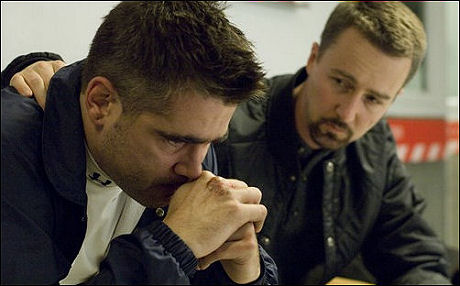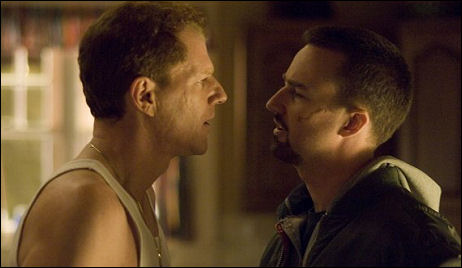It’s time to set things straight about Gavin O’Connor‘s Pride and Glory. I saw it last night, and as far as I’m concerned it’s the absolute opposite of a “problem movie” despite last fall’s diseased, head-scratching decision by New Line’s Bob Shaye not to release it in 2008. That may change.

Edward Norton in Pride and Glory
The issue was aired last February when O’Connor complained to Variety‘s Michael Fleming that New Line’s honcho Robert Shaye had done obvious harm to his film by pulling the plug on a 3.14.08 release date and bumping it into 2009.
Costar Colin Farrell elaborated during an In Bruges junket interview when he said “there’s this rumor going around that [Pride and Glory has been bumped] because it’s a mess or it’s a really bad film. I feel the need to kind of speak up, not from my own end but genuinely for Gavin O’Connor because he wrote and directed it. It’s just a really really strong piece, but I think New Line lost the bollocks on The Golden Compass…and they literally don’t have enough money to market things.”
Having finally seen O’Connor’s film, I can say with authority that Shaye’s decision was cowardly and pathetic. In this context, he was just as much of a criminal as the murdering, drug-dealing cops in the movie. Pride and Glory isn’t letter perfect from top to bottom, but it’s much, much better than I thought it would be, and the truth is that I drove home last night feeling close to delighted. If you’re a distributor, you don’t yank movies like this. You need to show some moxie and push them as best you can because quality wills out, damn it, and demands a day in the sun.
This thing, I swear, has a carefully parsed intensity that woke me out of my usual Wednesday-night blahs. Most of it seems to happen in Brooklyn or Queens with a little Manhattan thrown in. It’s wild and manic and surging with energy and sometimes mad as a loon (but rightly so, given the dirty-borough-cops storyline), and it really left me open-mouthed at times. I get that way when confronted by fierce but subtle acting, and especially when it’s all beautifully shot and swirled together in a big fat energy milkshake.
About halfway into the screening it hit me that the performances reach and even surpass, at times, the level of delivery in Michael Mann‘s Heat. Seriously. Power and Glory is an exceptional high-throttle thing that absolutely needs to see the light of day this year. Word around the campfire is that with New Line now reduced to a small production company status, Picturehouse or Warner Independent or perhaps Warner Bros. itself may acquire it and do just that.
The plot and the milieu are familiar, but it’s the singer, not the song. Emotionally complex and yet clear-headed with a carefully worked-out story, it’s basically about working-class ethics and morality under pressure and under fire. Like with James Gray‘s We Own The Night, Pride and Glory is about a big blue-collar family of cops, this time called the Tierneys. It’s primarily about having to struggle with crime and corruption within their own ranks.

It’s also similar to (though much better than) David Ayer‘s Street Kings, which dealt with a gang of rogue cops involved in drug dealing and all the attendant sins.
The conflict comes when Ray Tierney (Edward Norton) investigates a case that involving the murder of four policemen, and eventually leads to a dirty-cop scandal involving his brother-in-law Jimmy (Colin Farrell). The third brother, a go-alonger named Francis Jr., is played by Noah Emmerich. Their father, Francis Sr., a king of rationalization no matter the crime or the level of stink, is played by Jon Voight.
The script apparently began with an original by Robert Hopes, and then a rewrite collaboration between O’Connor and his brother Greg, and then another rewrite by Joe Carnahan. I just wish it wasn’t titled Pride and Glory, which unfortunately suggests an emotionally simplistic sports saga.
The gifted O’Connor (Miracle, Tumbleweeds) has put together something very vulnerable, soulful and alive-in-the-moment. Pride and Glory is a cup-runneth- over drama in that intensity rules and emotions are often (but not always) fully cranked. All I know is that I was driven half-mad with exasperation as I sat through similar stuff in We Own The Night, but I felt aroused and lifted during last night’s showing. This is not just another crazy-sick-cops movie. Melodrama is melodrama and the form is the form, but special things happen when exceptional craft and restraint are brought to bear.

Noah Emmmerich, Norton in Pride and Glory
I don’t know when I started to realize that P&G was a few cuts above, but it was early on. It started with the combination of Declan Quinn‘s darting hand-held photography, the knockout editing by Lisa Zeno Chrugin and John Gilroy, and the acting…my God! We’re not talking just two or three standouts but several brave, refined, super-intimate performances.
Norton is as good here as he was in The 25th Hour, and by my standards that’s as good as it gets. Farrell has now hit three homers in a row playing tragic, troubled losers — in O’Connor’s film, Martin McDonagh‘s In Bruges and Woody Allen‘s Cassandra’s Dream. Emmerich is as good here as I’ve ever seen him. John Ortiz (who played Russell Crowe‘s corrupt detective partner in American Gangster) is also special, and so are Frank Grillo, Manny Perez, Jennifer Ehle (whose head is shaved in this thing — what’s that about?), Wayne Duvall, Ramon Rodriguez, Carmen Ejogo, Shea Wigham.
Some IMDB guy wrote a few months ago that Pride and Glory “is the kind of American movie you don’t see anymore, a throwback to the big themes and dramatic tone of the 1950s, when Elia Kazan was making movies like East of Eden and On the Waterfront and Arthur Miller was writing plays like Death of a Salesman and All My Sons.
“Family, honor, corruption, right and wrong, fathers and sons–these are the kinds of issues that director/co-writer Gavin O’Connor is taking on, and in doing so he’s made a timeless film. Sincere without being sentimental (much like Miracle, O’Connor’s last effort) and familiar and original at the same time, this is a muscular, old-school American film, with big themes splashed on a big canvas. In the Age of Irony, these are the kinds of movies you rarely see anymore.”









